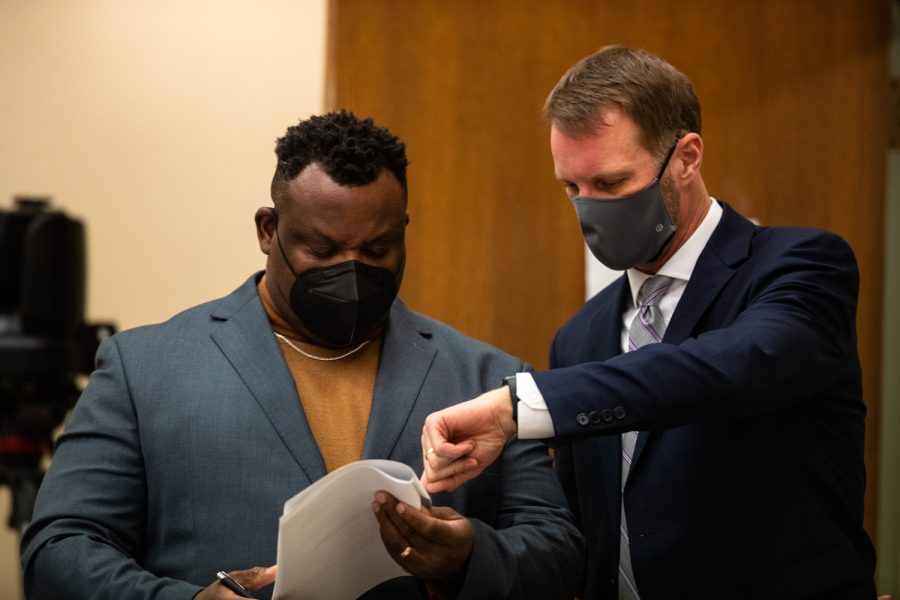Iowa City City Council nears rule change for public comment period
The council focused on the final alterations to its meeting protocols on Tuesday. The proposed rules would give the mayor more discretion in removing attendees found to be disruptive from meetings.
Mayor Bruce Teague listens to Iowa City City Attorney Eric Goers at an Iowa City City Council meeting on Tuesday, Feb. 15, 2022. Teauge gave his State of the City address, the city council heard concerns from the Center of Worker Justice, and the city council discussed meeting protocols.
February 15, 2022
As the Iowa City City Council works to rewrite the rules governing public comment at meetings, most councilors favored removing language that called for charging disruptive attendees with “criminal offenses” if found applicable.
The councilors asked Iowa City Attorney Eric Goers to draw up a near-final draft of the council’s meeting protocols at the meeting on Tuesday.
Current drafts of the council rules would still allow the presiding officer — usually the mayor — to kick out attendees, bar them from future meetings, or charge them with a municipal infraction if they are found to be breaking the council rules.
In Des Moines, residents have been arrested at city council meetings for speaking on issues outside of allocated public comment time.
Councilor Janice Weiner made a few late alterations removing wording about criminal charges against public commenters, addressing First Amendment concerns raised during the previous meeting.
“My proposed changes are largely in line with what we’re discussing to really focus on what the First Amendment rights are,” Weiner said.
Councilor John Thomas said he favored adjusting the rules to allow council staff to respond to public comment. Under the current rules, public comment cannot be met with any substantive response from the council.
“We [should] try to apply, with some level of judgment, when it’s appropriate for the council to ask staff to respond in the moment,” Thomas said. “There are times when a prompt response would be acceptable and appropriate.”
In their changes, council members voiced support for being able to remove commenters whose words stretch outside constitutionally protected speech.
Mayor Bruce Teague expressed concerns about completely removing the term “criminal offenses” from the meeting protocols, saying the lack of codified criminal charges might cause more public outbursts because attendants would not be facing the potential of criminal charges.
“It’s not the wild west, it’s not a free-for-all,” Goers said. “This part is more about laying out expectations for folks. If we have something serious, although it’s hard to imagine every circumstance that might happen in the future, but if the circumstance comes up where criminal charges are appropriate, certainly they can be pursued.”
Councilor Laura Bergus reminded her fellow council members the rules apply beyond the current City Council, and she said she was worried about the discretion that would be given to the presiding officer during the meetings.
“The presiding officer is empowered to make determinations when violations have occurred,” Bergus said. “I don’t know that it makes sense for the presiding officer who is making the call if there was a crime.”
The meeting protocols will go through one more round of revisions, and Goers said the modified protocols will likely be ready to vote on by the next city council meeting on March 1.



